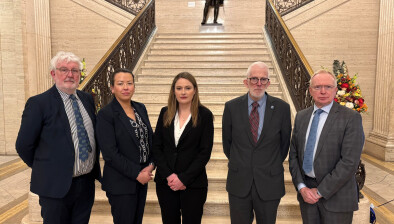NI: NI Court of Appeal: Man with UVF links loses harassment case against the Sunday World newspaper
A man who was identified as having links with the UVF, and as being involved in “punishment attacks” in the Village area of South Belfast, has had his case against the Sunday World dismissed by the Court of Appeal.

About this case:
- Judgment:
Agreeing with the trial judge’s finding that the newspaper had satisfied all aspects of responsible journalism in their publications, Lord Chief Justice Declan Morgan stated that there was a public interest in such investigative journalism into paramilitary activity.
Background
Sunday Newspapers Limited publishes the Sunday World newspaper in Dublin, and has a Northern edition sold in Northern Ireland.
The appellant, Mr Colin Fulton, complained that the Northern edition of the Sunday World published 28 articles about him between 2012 and 2014 making allegations “of a serious, inflammatory and highly controversial nature”.
The publications, which included photographs of Mr Fulton, contained allegations that Mr Fulton had UVF connections, was in the UVF, was defying the UVF leadership, was involved in acts of criminality linked to drugs, arms and explosive devices, and was involved in stirring up ‘turf wars’ and ‘sectarian squabbles’ in an area of Belfast known as The Village.
Notable among the allegations of criminality linked to Mr Fulton were “punishment attacks” on teenage boys, and an incident involving violence against girls who had brought a Catholic to a Rangers Supporters Club near the Village.
Court of Appeal
Mr Fulton appealed against the decision of Deeny J on 9 December 2015, in which he rejected Mr Fulton’s claim for damages and injunctive relief under the Protection from Harassment (Northern Ireland) Order 1997
Arguments related to Article 2 of the Convention were not pursued upon the appeal reflecting the findings of the trial judge
Mr Fulton submitted that the statutory tort of harassment was intended to protect intrusion into a person’s private and family life. That was also protected by the tort of misuse of private information. There were particular features of the course of conduct in this case which Mr Fulton submitted were objectionable.
Mr Fulton submitted that the articles were published in bad faith and were motivated by hatred that the journalists held for Mr Fulton.
Reasonableness and Rationality
The Court of Appeal was satisfied that the trial judge properly set out the applicable law and in particular paid close attention to Thomas v News Group Newspapers Ltd and Another EWCA Civ 1233 and King v Sunday Newspapers Ltd.
In light of the conclusion about the course of conduct amounting to harassment and causing anxiety, the issue was whether the particular circumstances made the pursuit of the course of conduct reasonable.
In this regard, the Court of Appeal accepted that there was “a difference between rationality and reasonableness”.
As per Hayes v Willoughby, rationality applies a minimum objective standard to the relevant person’s mental processes importing a requirement of good faith, some logical connection between the evidence and the reasons for the decision and an absence of arbitrariness.
Reasonableness is a more demanding objective standard requiring the publisher to satisfy the court that the circumstances are such that publication would not constitute an abuse of the freedom of the press. It is not sufficient that the publisher suspects or believes on reasonable grounds that the allegations are true.
The Court of Appeal noted that an additional factor in this case was the public interest in exposing this alleged paramilitary influence in a loyalist area of Belfast which the investigations conducted by the newspaper uncovered.
In making his judgment about the reasonableness of the conduct the trial judge took into account the seriousness of the allegation and, in Mr Fulton’s favour, the fact that he had not been arrested or questioned by the PSNI about these serious allegations.
Mr Fulton suggested that it was inappropriate for a newspaper to expose alleged criminal wrongdoing on the basis that this was a matter for the PSNI or other law enforcement agencies – in that the exposure of such allegations did not constitute matters of public interest.
Rejecting Mr Fulton’s submissions, the Court of Appeal stated that it was “an entirely appropriate role for the press to draw to the attention of the public allegations of serious wrongdoing”.
While the press must act responsibly in doing so, “it does not follow… that there is a burden upon the press in such a situation to demonstrate the truth of the allegations in order to resist a claim for harassment. That would be to import concepts from defamation law which do not apply”.
In considering reasonableness in the context of investigative journalism, the Court of Appeal accepted that there was a public interest in examining allegations of criminal behaviour by paramilitaries linked to the UVF in the South Belfast area – and the role of the press was “all the more important where the PSNI accepts that there is a problem of paramilitary criminality but is unable to take effective steps to stop it”.
The bona fides of the reporters and the nature of the investigation were also material – the journalists involved had checked and rechecked their sources prior to publication and continued to publish material about what was alleged to be an ongoing criminal enterprise.
As such, the Court of Appeal was satisfied many of the elements of responsible journalism were satisfied.
Finding “no reason to disturb the finding” of the trial judge, the Court of Appeal agreed that “the respondent demonstrated that its approach was reasonable in the circumstances and that the publication should be seen as a robust expression of press freedom which the courts have a duty to protect”.









